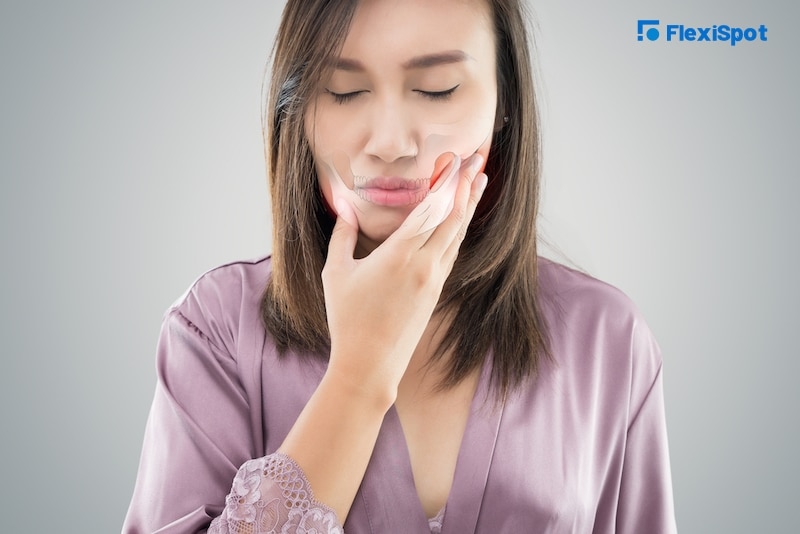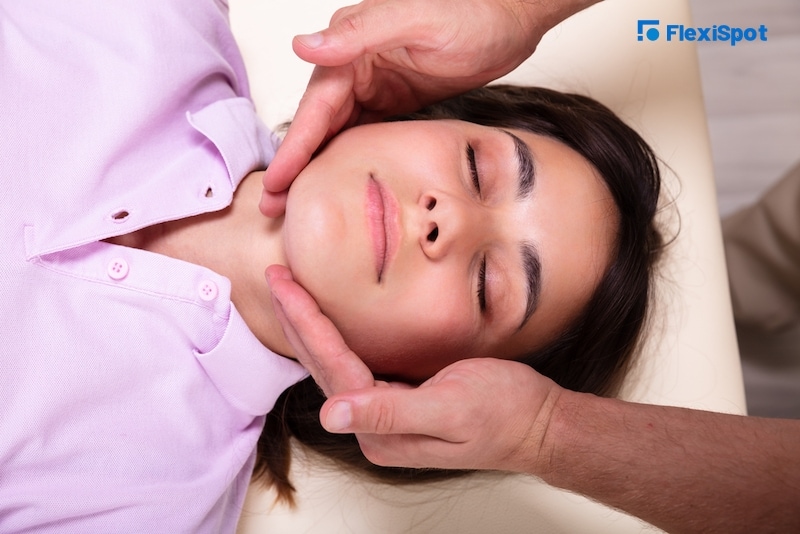Most people know there's a connection between jaw tension and stress, but you might be surprised about some ways jaw tightness can affect the rest of your body.
Jaw tension affects lots of people at some point in their life. For many it's short-lived, but for some it can become an ongoing concern. Left unchecked, it can cause not only increasing pain in the jaw but also dental problems, nerve irritation and even difficulties with eating, drinking, or talking.
If you have continual or recurring jaw issues, it's a good idea to figure out why and take steps to remedy the problem.
Common Symptoms of Jaw Tension
Jaw tension can show up in many ways and locations. You might feel it on just one side or both, and for some, it can even flip-flop. It can also cause headaches and earaches, as well as discomfort in your mouth or nose.
Your neck, shoulders, and back muscles connect to your jaw, so tightness in any of these areas can impact the others. They all get hit hard by stress, so it's no wonder symptoms tend to get worse at work (or before work, or after work, or anytime since we all work too much).
Jaw pain can be mild or intense, and the quality can be achy, throbbing, or even electrical. Chewing can be painful in some cases, or even less forceful movements like speaking or yawning. Clicking in the jaw can sometimes accompany tension or pain, but it's not necessarily a problem on its own.
Let's look at two particular jaw conditions that affect lots of people: TMJ and Bruxism.
TMJ (Temporomandibular joint and muscle disorders)
The National Institute of Health (NIH) defines TMJ as "a group of conditions that cause pain and dysfunction in the jaw joint and muscles that control jaw movement."
The NIH breaks down this set of conditions into three main categories: muscle tension, bone and joint problems, and arthritis. You may have one or all of these issues affecting your jaw, and if your problem is severe or persistent, it's important to work with a healthcare provider to find out which ones you're dealing with.
Bruxism (Grinding)
Some people have tension in their jaw due to unconscious clenching, grinding, or gnashing their teeth. This can happen both awake and asleep, and it can cause not only jaw pain but also headaches and cracked teeth.
Most people intuitively sense that this condition is linked to stress, and scientists have found evidence that backs up this idea.
According to the Mayo Clinic, you may be experiencing bruxism if you have:
- aching, worn, chipped, cracked, or loose teeth
- pain or soreness in your neck or face
- tired, tight, sore, or even locked jaw muscles, or
- dull headaches starting in the temples
Another telltale sign is your significant other being mad at you for disturbing their beauty sleep with the annoying sound of your grinding. And if you wake yourself up, you know it's really bad.
Easing Jaw Tension
So what's the solution? Stress-free life, anyone? Since that's probably not in the cards, many dentists recommend bite guards to protect the teeth while sleeping, while a variety of massage techniques, stretches, and exercises may also help ease the physical tension.
Let's look at some practices that may help relieve jaw tension.
Breathing For Jaw Relief
Most of us don't breathe well. Stress makes your breathing more rapid and shallow, and vice versa. Focused on your tasks in the daily grind, your shallow breathing creates more stress, which keeps your breath shallow. And the cycle goes on.
You enter a fight-or-flight response. Your muscles, especially the ones around your jaw, get tight, and at some point, they start to hurt.
You've got to interrupt the pattern. Fortunately, we can control our breathing, so it's the perfect entry point for breaking out of this downward spiral.
Massage For Your Jaw
Massage feels good, relaxes muscles, calms the nervous system, and triggers the production of happiness hormones. What's not to love? Try some self-massage throughout your day, and especially before bed. You can try gentle but firm circular motions, or look for sensitive spots where you can press in deeper, like right below your cheekbone.
A washcloth warmed up with hot water and then applied to the sides of your face before bed may also help.
Stretches and exercises
Many exercises can help your jaw, but it may take some trial and error to find what works for you. If you experience intense pain with any exercise, stop and consider contacting a healthcare provider. Here are a few to try:
- Strengthen your neck and shoulders by cradling the back of your head and pressing back into your hands. A variation is to press the side of your head against one of your hands as if trying to touch your ear to your shoulder but stopping yourself.
- Stretch your jaw joints by opening as wide as you can while keeping the tip of your tongue touching the roof of your mouth (the tongue contact is important to keep from straining the jaw muscles).
- Rotate your head slowly to each side, holding for a moment at the maximum point of rotation. Repeat several times, each time trying to increase the range of motion. Be sure to breathe deeply and keep your jaw relaxed the whole time.
Apart from any specific technique or exercise, try to find ways to reduce your stress. Don't take things so seriously. Have fun and hang out with positive people who care about you. Do nice things for others and help them feel better in their own lives. These simple approaches to life can do wonders for your mind as well as your jaw.
We hope you'll try some of the ideas in this article for yourself, and we want to hear about your experience. Tell us how it goes in the comments below!



















